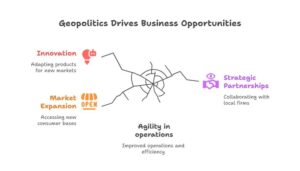Could there be an upside amid all the muck of geopolitics?
Geopolitics is frequently viewed through a lens of risk and uncertainty. Companies often brace for disruptions caused by political tensions, trade wars, and shifting regulations. We’ve seen this in recent years—from the decoupling of the U.S. and China to ongoing conflicts in regions like the Congo.
While these forces can lead to instability, they can also create unique opportunities for businesses willing to adapt and innovate. Understanding these dynamics is crucial for organizations aiming to thrive in today’s global marketplace.
1. Emerging Markets
Political shifts can unlock access to regions that were previously off-limits. Eased trade restrictions and new alliances may allow businesses to tap into fresh consumer bases and enter high-growth markets.
2. Diversification
Geopolitical change encourages operational diversification. Businesses that proactively expand into new markets or reconfigure supply chains reduce their dependency on a single region and increase long-term resilience.
3. Product Development
Geopolitical complexity often drives innovation. Companies adapt their offerings to meet diverse legal, cultural, or regulatory needs—resulting in tailored, competitive products for different regions.
4. Agility in Operations
Businesses that stay agile and responsive in the face of geopolitical shifts gain a lasting competitive edge. This adaptability leads to stronger execution, faster pivots, and improved efficiency.
At The Strategy Center, we help organizations navigate these uncertainties. Using proven frameworks like Balanced Scorecard, Value Innovation, and Blue Ocean Strategy, we guide businesses in staying agile, focused, and positioned to win—even in turbulent times.
While geopolitics is often seen as a challenge, it could also be a strategic advantage—perhaps even the holy grail—for those who are ready to act boldly and strategically.
Rethinking Geopolitics in Business Strategy
